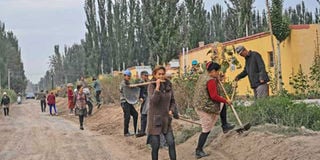China seeks support from Africa on Uighur policy

People in a small village where ethnic Uighurs live on the outskirts of Shayar in the region of Xinjiang. PHOTO | HECTOR RETAMAL | AFP
What you need to know:
- The region borders six countries, making it an important route in China’s Belt and Road Initiative launched by President Xi Jinping in 2016.
- Beijing refuted the claims, saying what is happening in Xinjiang is deradicalisation.
China has defended programmes implemented in the autonomous region of Xinjiang, where Beijing has been accused of violating human rights.
This week, Foreign Ministry officials circulated documents detailing “the redevelopment of Xinjiang” and rejected accusations of punishing locals.
A White Paper on “the Fight Against Terrorism and Extremism and Human Rights Protection in Xinjiang” says authorities are guided by international norms, including respect for human rights.
“Terrorism was once frequent in Xinjiang, destroying peace, order, unity … and showing callous disdain for the people's right to life, health, development and other basic rights,” the document says.
TERRORIST ATROCITIES
“In the face of terrorist atrocities, the local government has launched preventive and punitive countermeasures in accordance with the law and perseveres with deterrence against terrorist forces, maximising its efforts to protect basic human rights.”
Formally known as Xinjiang Uighur Autonomous Region, Xinjiang which has the highest Muslim population in China, lies in the northwest and was established nearly six decades ago.
The region borders six countries, making it an important route in China’s Belt and Road Initiative launched by President Xi Jinping in 2016.
Last week, the US State Department announced it would restrict visas for several senior Chinese officials “for taking part in rights violations in Xinjiang”.
Beijing refuted the claims, saying what is happening in Xinjiang is deradicalisation.
The measures, Beijing argued, are aimed at eradicating “the breeding soil of extremism and terrorism”.
SEPARATISM
“They are in line with Chinese laws and international practices and are supported by all 25 million people of various ethnic groups in Xinjiang,” China’s ambassador to the US, Ciu Tiankai, said.
This week was the first time Chinese officials circulated documents to media houses in Africa on the issue.
In July, Uganda joined Algeria, Angola, Burkina Faso, Burundi, Cameroon, Comoros, Congo, the Democratic Republic of Congo and Djibouti in penning a joint letter to the UN Human Rights Council president in Geneva, defending China’s programme.
The letter included three dozen countries across the world, and was also signed by Egypt, Equatorial Guinea, Eritrea, Gabon, Mozambique, Nigeria, Somalia, South Sudan, Sudan, Togo, Zambia and Zimbabwe.
“We take note that terrorism, separatism and religious extremism have caused enormous damage to people of all ethnic groups in Xinjiang, seriously infringing upon human rights,” they wrote.
RENOUNCE ISLAM
“We note with appreciation that human rights are respected and protected in China in the process of counter-terrorism and deradicalisation. We call on relevant countries to refrain from employing unfounded charges against China, based on unconfirmed information.”
China’s official documents say that though they recognise the practice of Buddhism, Catholicism, Daoism, Islam and all Christian doctrines, regions like Xinjiang have faced the threat of extremism and separatism, seen as “evils” that could derail the plan to eradicate poverty and sustain China as one united country.
Beijing lists a group called the East Turkestan Islamic Movement, which once bid for secession but is now seen as a terrorist society associated with attacks on government installations.
In the wake of the threat, Chinese officials launched a programme to “re-educate” locals.
Critics say the scheme is forced on locals and includes making them renounce Islam.
In a series of statements, Beijing described the programme, arguing that only training occurs.
PROFESSIONAL SKILLS
“The truth is the education and training centres in Xinjiang are schools that help the people concerned free themselves from... extremism and terrorism and acquire professional skills. The centres are anything but horrific concentration camps,” Chinese Foreign Minister Wang Yi said.
“We have invited nearly 1,000 personnel from the diplomatic, media and academic circles of western countries, including the US to Xinjiang this year. The impression they share is that the situation … is far different from what some western forces and media reported.”
At a recent dinner hosted by the National Committee on US-China Relations, US-China Business Council, US Chamber of Commerce and Council on Foreign Relations in New York, Wang said there won’t be economic development in Xinjiang unless the threat of violence stops.





